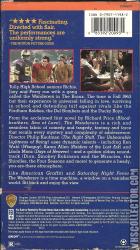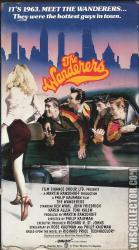The Wanderers
Catalog Number
22009
-
Primary Distributor (If not listed, select "OTHER")
Catalog Number
22009
Primary Distributor (If not listed, select "OTHER")
Release Year
Country
N/A (NTSC)
N/A | N/A | N/A
N/A | N/A
The Wanderers (1979)
Additional Information
Additional Information
It's 1963. Meet The Wanderers... They were the hottest guys in town.
The magic, the music, the mystery of growing up.
It was The Wanderers against the world... and the world never had a chance!
The year 1979 saw an epidemic of American street-gang films, including Phil Kaufman's hit period drama The Wanderers. Set in the Bronx in 1963, the film concerns the titular gang of Italian-American teens and their ongoing power struggle with the rival "Fordham Baldies." Richard Price, upon whose novel this film was based, drew from his own experiences to weave his tale. Essentially a series of anecdotes-some tension-filled, some amusing -- The Wanderers climaxes on the occasion of the J.F.K. assassination, which for Price and hundreds and thousands of his aimless contemporaries served as a wake-up call. Viewed from the vantage point of the 1990s, one would wish that the current street gangs be shocked into adulthood with such suddenness (though not through the same tragic means). Ken Wahl, Karen Allen, and Linda Manz are among the standout performers in this richly detailed period piece. ~
It tells the story of several Italian-American youths growing up together amid the various gangs of 1963 New York City. The film stars Ken Wahl, features Karen Allen and was directed by Philip Kaufman. In an interview for American Film in November 1983, Kaufman (who ran with a gang whilst growing up in Chicago in the 1950s) said he "had been wanting to do a gang movie for years - the urban experience, the darker side of teenagers growing up." Kaufman and his wife Rose wrote the screenplay, making a more cohesive story out of Price's episodic novel. Years later, Kaufman said, "I think Richard Price would say that his novel was really a bunch of short stories, and we really tried to make one story out of them all."[1] The Kaufmans also swapped characteristics between the individual Wanderers in the transition from novel to film. For instance, in the book it is Wanderer Buddy Borsalino who marries Despie Galasso; in the movie, protagonist Richie who marries Despie, and Buddy is relegated to a supporting role in the story. Also, in the book, one of the major characters is a Wanderer named Eugene, who does not appear in the movie at all.
In his book Cult Movies III, Danny Peary notes that "many critics who loved the book would later accuse Kaufman of doing the novel a disservice...But Price would disagree: "I love that picture. It's not my book, and I don't care. The spirit is right, and the way Phil Kaufman directed it showed me another way of looking at my own book.""[2]
Although it was not a box office success upon its theatrical release, The Wanderers gained popularity and cult status over the years because of its sensitive depiction of teenagers coming of age. The gangs named in the movie, though fictionalized, are based on real gangs encountered by Price in his childhood, growing up in a housing project in the Bronx. Real names of Bronx gangs (1950s-1960s) are used. "The Wanderers" was the name of an actual gang located in South Brooklyn that was part of the larger South Brooklyn Boys gang. The movie depicts the end of a more innocent time (1950s to early 1960s.), reflected by the violent death of Turkey (a former Wanderer), the recruitment of the Fordham Baldies into the Marines (a subtle foreshadowing of the Vietnam War), the assassination of President John F. Kennedy, the imminent marriage and domestication of Wanderers leader Richie, the departure of Wanderers Joey and Perry (who drive off to California), and a scene depicting then-rising folk singer Bob Dylan in Greenwich Village performing his song "The Times They Are A-Changin'". Kaufman later said, "When I was shooting Goldstein, we came out on the street one day and I saw people were staggering down the street crying. We were walking around with our cameras and saw a bunch of people standing around a store window, looking in and crying. That was how I found out that JFK had been killed. We duplicated that in The Wanderers with the people looking in the department store window at all the TVs, watching the news that JFK had been assassinated. I love that moment when Ritchie (the protagonist) sees this transition happen and he decides to go back to the old neighborhood and stay in the old world, instead of going to see Bob Dylan with the Karen Allen character and joining the new world
Release Date: July 13, 1979
Distrib: Warner Brothers
The magic, the music, the mystery of growing up.
It was The Wanderers against the world... and the world never had a chance!
The year 1979 saw an epidemic of American street-gang films, including Phil Kaufman's hit period drama The Wanderers. Set in the Bronx in 1963, the film concerns the titular gang of Italian-American teens and their ongoing power struggle with the rival "Fordham Baldies." Richard Price, upon whose novel this film was based, drew from his own experiences to weave his tale. Essentially a series of anecdotes-some tension-filled, some amusing -- The Wanderers climaxes on the occasion of the J.F.K. assassination, which for Price and hundreds and thousands of his aimless contemporaries served as a wake-up call. Viewed from the vantage point of the 1990s, one would wish that the current street gangs be shocked into adulthood with such suddenness (though not through the same tragic means). Ken Wahl, Karen Allen, and Linda Manz are among the standout performers in this richly detailed period piece. ~
It tells the story of several Italian-American youths growing up together amid the various gangs of 1963 New York City. The film stars Ken Wahl, features Karen Allen and was directed by Philip Kaufman. In an interview for American Film in November 1983, Kaufman (who ran with a gang whilst growing up in Chicago in the 1950s) said he "had been wanting to do a gang movie for years - the urban experience, the darker side of teenagers growing up." Kaufman and his wife Rose wrote the screenplay, making a more cohesive story out of Price's episodic novel. Years later, Kaufman said, "I think Richard Price would say that his novel was really a bunch of short stories, and we really tried to make one story out of them all."[1] The Kaufmans also swapped characteristics between the individual Wanderers in the transition from novel to film. For instance, in the book it is Wanderer Buddy Borsalino who marries Despie Galasso; in the movie, protagonist Richie who marries Despie, and Buddy is relegated to a supporting role in the story. Also, in the book, one of the major characters is a Wanderer named Eugene, who does not appear in the movie at all.
In his book Cult Movies III, Danny Peary notes that "many critics who loved the book would later accuse Kaufman of doing the novel a disservice...But Price would disagree: "I love that picture. It's not my book, and I don't care. The spirit is right, and the way Phil Kaufman directed it showed me another way of looking at my own book.""[2]
Although it was not a box office success upon its theatrical release, The Wanderers gained popularity and cult status over the years because of its sensitive depiction of teenagers coming of age. The gangs named in the movie, though fictionalized, are based on real gangs encountered by Price in his childhood, growing up in a housing project in the Bronx. Real names of Bronx gangs (1950s-1960s) are used. "The Wanderers" was the name of an actual gang located in South Brooklyn that was part of the larger South Brooklyn Boys gang. The movie depicts the end of a more innocent time (1950s to early 1960s.), reflected by the violent death of Turkey (a former Wanderer), the recruitment of the Fordham Baldies into the Marines (a subtle foreshadowing of the Vietnam War), the assassination of President John F. Kennedy, the imminent marriage and domestication of Wanderers leader Richie, the departure of Wanderers Joey and Perry (who drive off to California), and a scene depicting then-rising folk singer Bob Dylan in Greenwich Village performing his song "The Times They Are A-Changin'". Kaufman later said, "When I was shooting Goldstein, we came out on the street one day and I saw people were staggering down the street crying. We were walking around with our cameras and saw a bunch of people standing around a store window, looking in and crying. That was how I found out that JFK had been killed. We duplicated that in The Wanderers with the people looking in the department store window at all the TVs, watching the news that JFK had been assassinated. I love that moment when Ritchie (the protagonist) sees this transition happen and he decides to go back to the old neighborhood and stay in the old world, instead of going to see Bob Dylan with the Karen Allen character and joining the new world
Release Date: July 13, 1979
Distrib: Warner Brothers






Comments0
Login / Register to post comments